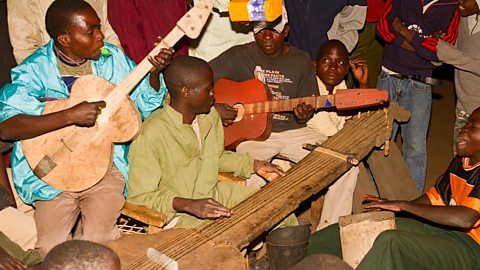African music

In Africa, music is a big part of everyday life. Many communities come together to sing, clap and dance to music. Traditionally music is passed on through oral tradition and is not usually written down.
Singing
a cappellaVocal music performed without instrumental accompaniment songs are used for every occasion including lullabies, childrens’ games, birthdays, marriages, funerals and the more formal situations like religious, political and tribal events.
Songs are usually strophicA piece of music in which all verses are sung or played to the same music. - where the verse and chorus are repeated. They can also take the form of call and response where a leader sings a phrase known as the 'call' and is answered by voices in harmony known as the 'response'. This is like question and answer. The chorus is sung in block chords of harmony known as homophonicHaving one line of melody that is played by all instruments at the same time. Literally 'sounding together'..
Abezizwe Ngeke Bayiqede performed by Ladysmith Black Mambazo
African instruments
Singing can often be accompanied by African drums and other instruments such as bells, xylophones and a variety of stringed instruments.
There are a variety of types of African drums that vary from country to country. Some of the various types of drums:
- can be played with the hand or sticks
- are held under or balanced in front of the player
- are usually made from wood or gourds (large dried out fruit)
- come in a variety of shapes and sizes, producing a variety of different sounds
- frequently play an ostinatoA short melodic phrase that is repeated persistently or (repeated pattern)
In drum ensembles, the rhythmic patterns can be very complex and interlock with each other. Sometimes conflicting rhythms, those that have different time signatures, are played at the same time – this is called cross rhythm.
Listen out for cross rhythm in the audio clip below:
Mo Beru Agba performed by King Sunny Ade